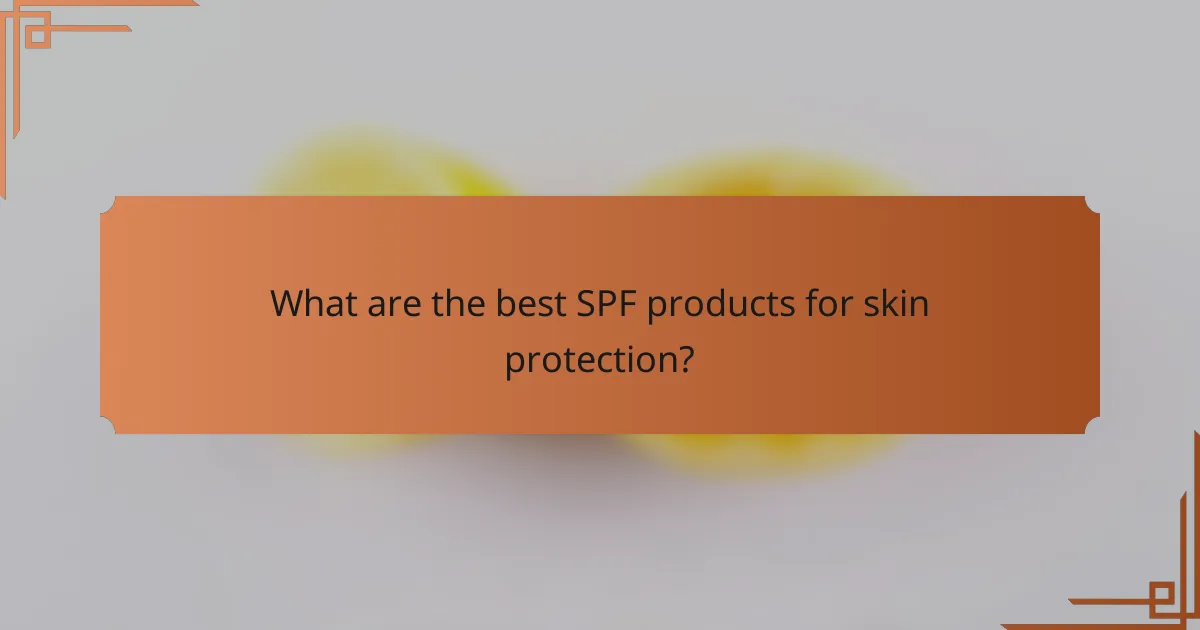Understanding SPF, or Sun Protection Factor, is essential for effective sun protection and preventing skin damage. It measures how well sunscreen shields your skin from harmful UV rays, indicating the duration you can safely spend in the sun. However, many myths about SPF can lead to inadequate protection, making it vital to discern facts from fiction when choosing the right sunscreen for your needs.

What are the best SPF products for skin protection?
The best SPF products for skin protection effectively block harmful UV rays while being suitable for various skin types and activities. Look for broad-spectrum protection with an SPF of at least 30, and consider water resistance if you plan to swim or sweat.
Neutrogena Ultra Sheer SPF 100
Neutrogena Ultra Sheer SPF 100 offers high-level protection against UVB and UVA rays. Its lightweight, non-greasy formula absorbs quickly, making it ideal for daily use or outdoor activities.
This sunscreen is water-resistant for up to 80 minutes, allowing for extended wear during swimming or sweating. Users appreciate its broad-spectrum coverage and the fact that it does not leave a heavy residue on the skin.
Coppertone Sport Sunscreen SPF 50
Coppertone Sport Sunscreen SPF 50 is designed for active individuals, providing strong protection while resisting sweat and water. This product is ideal for sports enthusiasts who need reliable coverage during physical activities.
It is water-resistant for up to 80 minutes and features a lightweight formula that dries quickly. The easy application spray format makes it convenient for on-the-go use.
La Roche-Posay Anthelios SPF 60
La Roche-Posay Anthelios SPF 60 is known for its advanced UVA protection and is suitable for sensitive skin. This sunscreen contains antioxidants that help protect against environmental damage.
Its lightweight texture absorbs easily without leaving a greasy finish. It is also water-resistant for up to 40 minutes, making it a great choice for beach days or outdoor events.
Banana Boat Ultra Sport SPF 50
Banana Boat Ultra Sport SPF 50 is formulated for those who enjoy outdoor sports, providing durable protection against sun exposure. Its water and sweat-resistant formula ensures that it stays effective during vigorous activities.
This sunscreen is available in both lotion and spray forms, catering to personal preferences. Users often highlight its long-lasting protection and ease of application.
EltaMD UV Clear SPF 46
EltaMD UV Clear SPF 46 is a favorite among those with acne-prone or sensitive skin. This sunscreen contains niacinamide, which helps calm and protect the skin while offering broad-spectrum protection.
Its lightweight, oil-free formula makes it suitable for daily use under makeup. It is also water-resistant for up to 40 minutes, providing reliable coverage for everyday activities.

How does SPF work to protect your skin?
SPF, or Sun Protection Factor, measures how well a sunscreen protects your skin from UV radiation. It indicates the time you can spend in the sun without getting sunburned compared to not wearing any sunscreen.
Absorbs UV radiation
SPF works primarily by absorbing or reflecting UV radiation, which can damage skin cells. Sunscreens contain active ingredients that either absorb UV rays, preventing them from penetrating the skin, or reflect them away. Common ingredients include zinc oxide and titanium dioxide, which provide broad-spectrum protection.
When choosing a sunscreen, look for a product labeled as “broad-spectrum,” which means it protects against both UVA and UVB rays. This is crucial for comprehensive skin protection.
Prevents sunburn
One of the primary functions of SPF is to prevent sunburn, which occurs when the skin is overexposed to UVB rays. A higher SPF rating indicates greater protection; for example, SPF 30 blocks about 97% of UVB rays, while SPF 50 blocks approximately 98%. However, no sunscreen can block 100% of UV rays.
To maximize protection, apply sunscreen generously and reapply every two hours, or more frequently if swimming or sweating. Remember that even on cloudy days, UV rays can penetrate through clouds, so sunscreen is necessary year-round.
Reduces skin cancer risk
Using sunscreen with an appropriate SPF can significantly reduce the risk of developing skin cancer. Regular application helps prevent the cumulative damage caused by UV exposure, which is a leading factor in skin cancer development. Studies suggest that consistent use of sunscreen can lower the incidence of melanoma and other skin cancers.
For effective skin cancer prevention, combine sunscreen use with other protective measures, such as wearing protective clothing, seeking shade during peak sun hours, and avoiding tanning beds. These strategies can enhance your overall skin health and safety.

What are common myths about SPF?
Many misconceptions surround SPF, leading to improper sun protection practices. Understanding these myths is crucial for effective skin care and preventing sun damage.
SPF 100 offers double the protection of SPF 50
This is a common belief, but it’s misleading. SPF 100 does not provide double the protection compared to SPF 50; instead, it offers slightly more, around 1% additional UVB protection. SPF 50 blocks about 98% of UVB rays, while SPF 100 blocks approximately 99%.
In practical terms, the difference in protection is minimal, and factors like application thickness and frequency are more critical for effective sun defense. It’s essential to apply sunscreen generously and reapply every two hours, regardless of the SPF level.
Dark skin doesn’t need sunscreen
This myth can lead to serious skin damage. While darker skin has more melanin, which provides some natural protection against UV rays, it is not immune to sunburn or skin cancer. Everyone, regardless of skin tone, should use sunscreen to protect against harmful UV radiation.
The American Academy of Dermatology recommends a broad-spectrum sunscreen with at least SPF 30 for all skin types. Regular application is key, especially during prolonged sun exposure.
SPF is only necessary on sunny days
Many people think sunscreen is only needed when the sun is shining brightly, but this is incorrect. UV rays can penetrate clouds and reflect off surfaces like water, sand, and concrete, leading to skin damage even on overcast days.
It’s advisable to wear sunscreen daily, regardless of the weather. A broad-spectrum sunscreen with at least SPF 30 should be part of your daily routine, especially if you spend time outdoors. Reapply every two hours for optimal protection.

What factors affect SPF effectiveness?
The effectiveness of SPF (Sun Protection Factor) is influenced by several key factors, including how much sunscreen is applied, how often it is reapplied, and individual skin characteristics. Understanding these elements can significantly enhance sun protection and reduce the risk of skin damage.
Application amount
The amount of sunscreen applied directly impacts its effectiveness. For optimal protection, a generous amount—approximately 1 ounce (about a shot glass full)—should be used to cover the entire body. Insufficient application can lead to a lower effective SPF than what is indicated on the label.
To ensure adequate coverage, apply sunscreen evenly to all exposed skin, including often-missed areas like the ears, back of the neck, and tops of the feet. Using a sunscreen with a higher SPF can help compensate for any under-application.
Reapplication frequency
Reapplying sunscreen is crucial for maintaining protection, especially after swimming, sweating, or towel drying. Generally, sunscreen should be reapplied every two hours, or more frequently if engaging in water activities. This helps maintain the intended level of SPF protection throughout the day.
To make reapplication easier, consider using a spray or powder sunscreen, which can be convenient for on-the-go touch-ups without disrupting makeup or clothing.
Skin type and sensitivity
Individual skin type and sensitivity play a significant role in how well SPF works. People with fair skin, a history of sunburns, or certain skin conditions may require higher SPF levels and more frequent application to achieve adequate protection. Understanding your skin’s unique needs can guide your sunscreen choices.
Additionally, those with sensitive skin should opt for broad-spectrum sunscreens that are hypoallergenic and free from irritating chemicals. Testing a small amount on a patch of skin before full application can help prevent adverse reactions.

How to choose the right SPF for your skin type?
Choosing the right SPF for your skin type involves understanding your skin’s unique characteristics and how they interact with sun exposure. Factors such as oiliness, sensitivity, and dryness can influence the type of sunscreen that will work best for you.
Oily skin: gel-based SPF
If you have oily skin, gel-based SPFs are often the best choice. These formulations are lightweight and absorb quickly, reducing the likelihood of clogged pores and breakouts. Look for products labeled as “oil-free” or “non-comedogenic” to ensure they won’t exacerbate oiliness.
When selecting a gel-based SPF, consider options with a higher SPF rating, typically between 30 and 50, to provide adequate protection without feeling heavy. Ingredients like hyaluronic acid can also help maintain hydration without adding extra oil.
To maximize effectiveness, apply the gel-based SPF generously and reapply every two hours, especially if you are sweating or swimming. Avoid common pitfalls like using too little product or skipping reapplication, as this can significantly reduce your sun protection.



